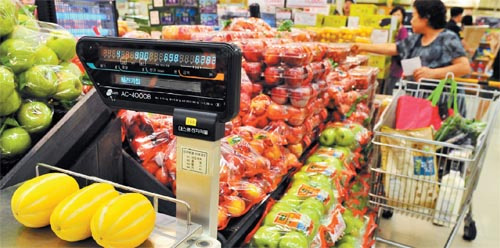
Market Information > 한국 농식품 시장뉴스
한국 농식품 시장뉴스
August 16, 2011
2011.08.17
[Viewpoint] Bracing for the worst-case scenario [English, CSY]
The dangers of budget crises have been loud and clear. Korea should ratify the U.S. FTA to prepare for a even fiercer trade war.
http://joongangdaily.joins.com/article/view.asp?aid=2940095
Obama urges ratification of FTA with S. Korea [English, CSY]
Korea, China consider sitting down for FTA talks [English, CSY]
http://joongangdaily.joins.com/article/view.asp?aid=2940204
Summary: Korea and China are considering starting negotiations for a free trade agreement (FTA), Korean Trade Minister Kim Jong-hoon said. “This can be a win-win,” Kim said late yesterday in Manado, Indonesia, where he attended a meeting of Association of Southeast Asian Nations trade ministers. “Certainly there are sensitivities on the part of Korea and on the part of China. Now we are talking about how we can take care of these sensitivities mutually. Then, we can expedite going into negotiations.”
China is Korea’s largest trading partner with total volume between the two nations reaching $180 billion in 2010, Kim said. Korea is “very close” to reaching an FTA with the U.S. and is negotiating FTAs with Australia, Turkey, Colombia and Canada, he said.
2. LIVESTOCK ISSUES
Deal on milk prices down to time line [English, CSY]
http://joongangdaily.joins.com/article/view.asp?aid=2940249
Summary: Dairy farmers and milk companies in Korea resumed talks yesterday to determine how much and when to raise the prices of raw milk after failing to find middle ground last week. Both sides failed to iron out their differences on Friday after holding three days of negotiations on price hikes of unpasteurized milk, raising concerns that the milk supply could be disrupted. They had a “cooling-off” period over the weekend and decided to restart the price talks, sources said. Milk companies earlier accepted the government’s proposal to raise raw milk prices by 138 won ($0.12) per liter, but dairy farmers stuck to their demand that the prices be raised by 145 won. The sources said that the difference that led to Friday’s breakdown could be narrowed as farmers expressed their intention to accept the government’s proposal.
3. MARKETING ISSUES
Prices of agricultural imports leap in July [English, CSY]
http://english.yonhapnews.co.kr/business/2011/08/11/89/0501000000AEN20110811005300320F.HTML
Full text: Import prices of major agricultural goods surged last month from a month earlier, adding to South Korea's already skyrocketing consumer prices, a report said Thursday. According to the report by the Korea Customs Service, the average import price of pumpkins jumped 59.4 percent from a month earlier to 1,207 won (US$1.11) per kilogram. The price also marked a 38 percent spike from the same period last year. Import prices of carrots and ginger also jumped 23.1 percent and 41.5 percent, respectively, from the previous month. The price of white cabbages, the main ingredient of the country's traditional dish kimchi, on the other hand, dropped 29.2 percent on-month as the country temporarily removed all import tariffs on cabbages and four other farm products, including radishes, until the end of next month. The removal of import duties on the five farm products, also including pork, came as the South Korean government is trying to get a handle on soaring consumer prices. South Korea's consumer prices jumped 4.7 percent on-year last month, surpassing the government's annual inflation target of 4 percent for the seventh straight month.

4. OTHER MISCELLANEOUS ISSUES
Consumers Prefer Products in 20,000 to 50,000 won Range for Chuseok Gifts [Korean, OSY]
http://www.hankyung.com/news/app/newsview.php?aid=2011081164071&sid=0106&nid=006<ype=1
Summary: According to a consumer survey by CJ, 51 percent of the respondents answered that they preferred products in 20,000 to 50,000 won range for Chuseok gifts.
Price of Garlic Down by 20.9 Percent over One Month [Korean, OSY]
http://www.hankyung.com/news/app/newsview.php?aid=2011081163441&sid=0104&nid=004<ype=1
Summary: According to aT, price of garlic in wholesale market marked 68,000 won per a 20 kg box, down 20.9 percent from one month ago. Price of garlic has been on a steep decline since May this year mainly because of a steep decline in the price of Chinese garlic imported into Korea. According to aT, import price of Chinese garlic has declined 80 percent compared to one year ago. Price of garlic is likely to remain weak throughout this year as local harvest is reportedly in good shape.
[Editorial] Rain, rain, rain [English, CSY]
http://www.koreaherald.com/opinion/Detail.jsp?newsMLId=20110815000006
Summary: Koreans will remember the summer of 2011 as having the heaviest rains in their life. The Korea Meteorological Administration’s observatories have recorded new records of precipitation per hour, the number of consecutive rainy days and other statistics. People lost their lives in mudslides, in suddenly flooded rooms and swollen river waters. Disaster-relief authorities cannot correctly compile damage reports as downpours, moving from one province to another, destroyed houses, river banks, bridges, railways and roads. Rice and other crops sit dead in inundated paddy fields and poultry has been lost by the thousands at flooded farms. In coastal areas, fish farms have been damaged by the rush of fresh water from the sky and from the land.
Vegetable prices have tripled due to sharply reduced supply. Department stores are in emergency mode to secure fruit to make gift packages for the Chuseok holiday. Suffering most are street vendors in cities who have to pass day after day without plying their trade on drenched sidewalks. Merchants and caterers at summer places complain of few customers in recent weeks.
The information in this report was compiled by the Agricultural Trade Office (ATO) at the U.S. Embassy in Seoul, South Korea. The press summaries contained herein do NOT reflect USDA, the U.S. Embassy, or other U.S. government agency official policy or view point. U.S. food exporters can learn more about market opportunities in South Korea by reviewing ATO Seoul’s Exporter Guide and other reports available at www.fas.usda.gov by clicking on “attaché reports”.
Agricultural Trade Office, U.S. Embassy - Seoul
Tel: 82-2-6951-6848 Fax: 82-2-720-7921
Email: atoseoul@state.gov